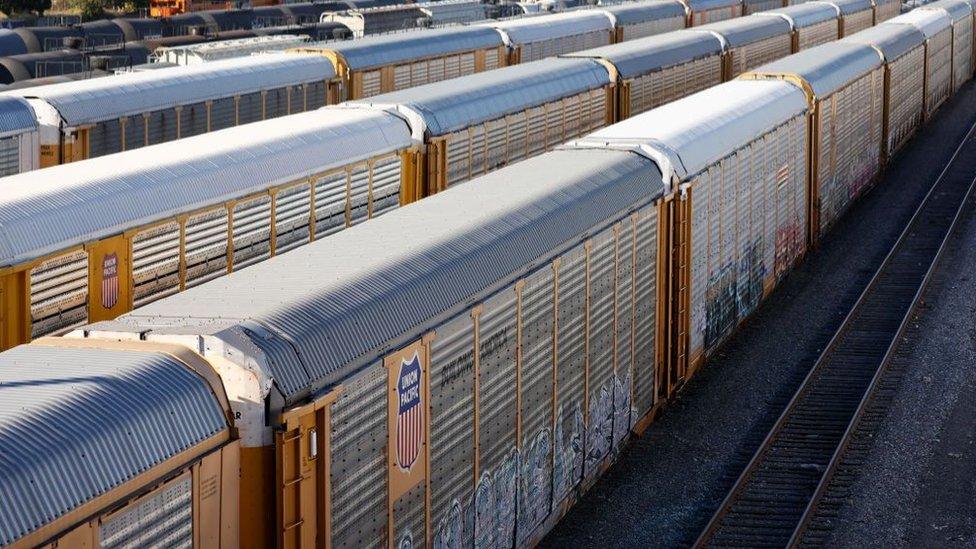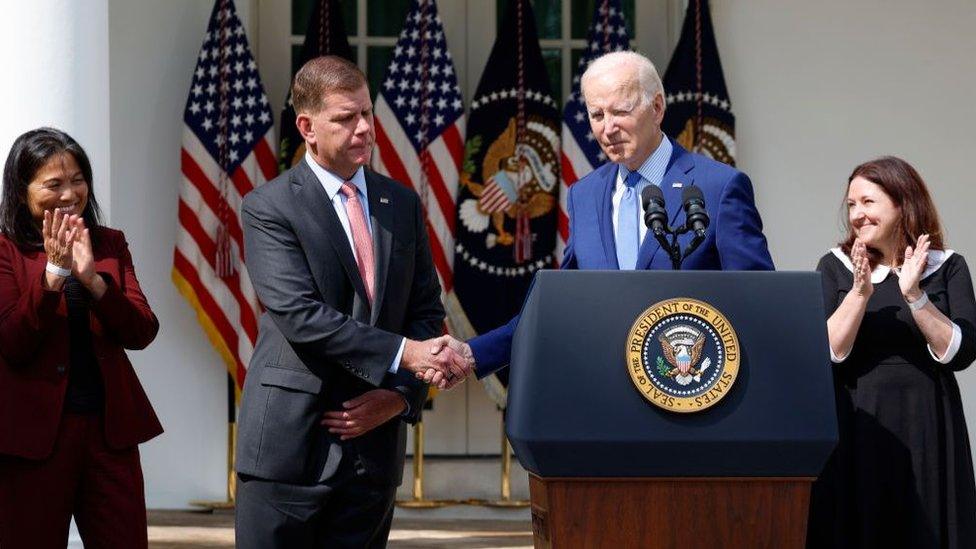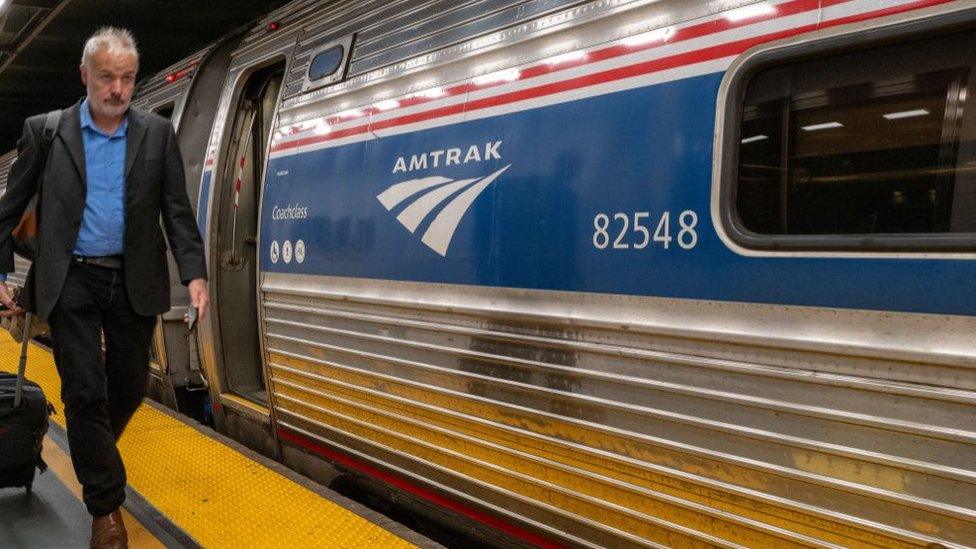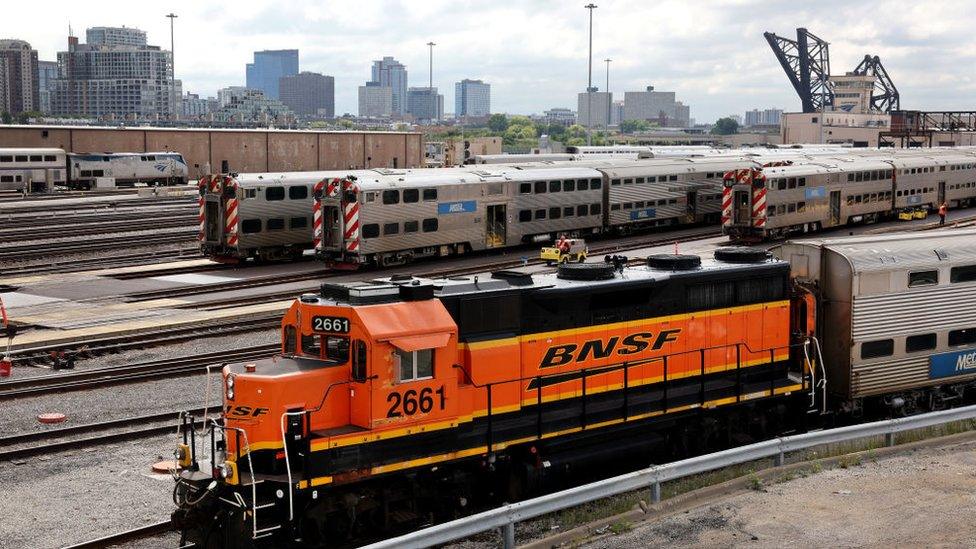US rail strike 2022: What would be affected if it happens?
- Published

The US is facing a potential national rail strike for the first time in 30 years
Lawmakers in the US House of Representatives and Senate voted to stave off a strike by railway workers that could potentially devastate the US economy.
The bill approved by Congress would bind companies and workers to a September agreement brokered by the Biden administration. It will now head to US President Joe Biden's desk for approval.
The Congress intervened at the request of Mr Biden who warned of severe economic consequences if rail workers went ahead with the strike.
If the strike happens, it would be the first in the US in decades and analysts say it could cripple the US economy if prolonged.
What would be affected by a rail strike?
The workers who would go on strike work for freight rail companies, such as Berkshire Hathaway's BNSF and Union Pacific.
They carry about 40% of the country's freight each year - vital goods including shipments of grain and other crops; chemicals such as fertiliser; three-quarters of new cars; roughly 70% of the country's coal and 30% of packaged food; as well as thousands of other products destined for store shelves.
If workers were to walk out on 9 December, that would knock roughly 7,000 freight trains per day out of service, wreaking havoc on supply chains across the country - driving up prices and causing a political mess just before Christmas.
For months, business groups have been calling on the government to prevent a strike, warning of economic calamity.
The Association of American Railroads, which represents the industry, estimates that the country would need more than 460,000 trucks per day to handle the goods affected - a logistical impossibility.
It says the impact would amount to $2bn (£1.66bn) in lost output a day, as ports and other transport options feel the knock-on effects.
In a report this fall, Goldman Sachs analysts said a strike of a few days would affect only about 3% of overall economic activity and have limited wider economic impact. But if it were prolonged, they warned it "would have a substantially greater economic effect", as companies are forced to slow production to deal with missing supplies or at-capacity storage.
Why is this happening?
Many railroad workers are unhappy about attendance policies that have been introduced in recent years, which they say make it difficult to take unplanned time off for issues like illness.
The 12 unions and major rail companies spent more than two years trying to negotiate a new contract before turning to the government earlier this year to try to broker a compromise deal for the more than 100,000 workers involved.
US President Joe Biden announced a deal in September, guaranteeing an additional day of personal leave and 24% pay rise over the years of the contract, which covers 2020 to 2024, among other benefits.

Some unions have rejected a deal the Biden administration brokered in September
Members of eight unions voted to ratify the deal. But workers at four of some of the biggest labour groups rejected it, saying the agreement did not address their fundamental concerns about issues like paid sick leave.
The unions have said they would all walk off the job together, in the event of a strike.
Would a rail strike affect Amtrak?
Amtrak and many local commuter rail routes run at least partially on tracks maintained by the railroads, so although the walkout threatens freight companies, it would have wider impact.
In September the threat of a work stoppage prompted Amtrak to cancel long distance routes.
Amtrak boss Stephen Gardner said Tuesday that a "shutdown would affect Amtrak's service across the nation" and urged Congress to act "well before" the 9 December deadline to minimise the impact.
Is a strike likely?
Not really. Congress, which has authority over inter-state commerce, has intervened in railroad labour negotiations 18 times since 1926, when the US passed a law regulating rail labour bargaining, according to the US Chamber of Commerce.
The last rail strike in the US, in 1992, lasted less than four days before the government put a stop to it.

Many Amtrak passenger trains run on tracks that belong to the freight rail companies
Earlier this week, President Biden had asked Congress to use its power to prevent a strike.
"As a proud pro-labour President, I am reluctant to override the ratification procedures and the views of those who voted against the agreement," he said. "But in this case - where the economic impact of a shutdown would hurt millions of other working people and families - I believe Congress must use its powers to adopt this deal."
Lawmakers in the House of Representatives from both parties on Wednesday responded to his call, voting 290-137 to force workers to accept the deal announced in September. On Thursday, the Senate approved the bill with an expedited vote of 80 to 15.
A separate bill, which passed at the House with almost no support from Republicans, also mandated seven days of paid sick leave. The Senate has yet to vote on this bill, though an amendment by Senator Bernie Sanders to add paid sick leave to the first bill failed.
The issues now moves to Mr Biden, who is expected to sign it into law. The fate of the paid sick leave bill, however, is uncertain.
Related topics
- Published15 September 2022
